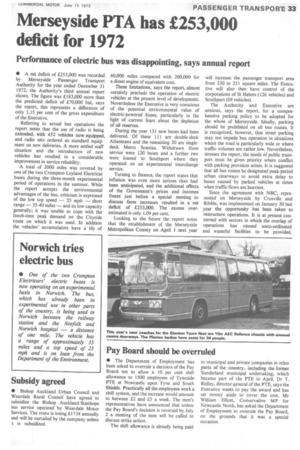Merseyside PTA has 1253,000 deficit for 1972
Page 35

If you've noticed an error in this article please click here to report it so we can fix it.
Performance of electric bus was disappointing, says annual report
• A net deficit of £253,000 was recorded by Merseyside Passenger Transport Authority for the year ended December 31 1972, the Authority's third annual report shows. The figure was £183,000 more than the predicted deficit of £70,000 but, says the report, this represents a difference of only 1.15 per cent of the gross expenditure of the Executive.
Referring to actual bus operations the report notes that the use of radio is being extended, with 452 vehicles now equipped, and radio sets ordered as standard equipment on new deliveries. A more settled staff situation and the introduction of new vehicles has resulted in a considerable improvement in service reliability.
A total of 2000 miles was covered by one of the two Crompton Leyland Electricar buses during the three-month experimental period of operations in the summer. While the report accepts the environmental advantages of the bus, criticism is expressed of the low top speed — 25 mph — short range — 35-40 miles — and its low capacity generally; it was unable to cope with the lunch-time peak demand on the Cityride route on which it was used. In addition the vehicles' accumulators have a life of 60,000 miles compared with 200,000 for a diesel engine of equivalent cost.
These limitations, says the report, almost certainly preclude the operation of electric vehicles at the present level of development. Nevertheless the Executive is very conscious of the potential environmental value of electric-powered buses, particularly in the light of current fears about the depletion of oil reserves.
During the year 131 new buses had been delivered. Of these 111 are double-deck Atlanteans and the remaining 20 are singledeck Metro Scanias. Withdrawn from service were 120 buses and a further two were loaned to Southport where they operated on an experimental interchange service.
Turning to finance, the report states that inflation was even more serious than had been anticipated, and the additional effects of the Govenment's prices and incomes freeze just before a special meeting to discuss fares increases resulted in a net deficit of £253,000. The excess overestimated is only 1.09 per cent.
Looking to the future the report notes that the establishment of the Merseyside Metropolitan County on April 1 next year will increase the passenger transport area from 230 to 251 square miles. The Executive will also then have control of the corporations of St Helens (126 vehicles) and Southport (69 vehicles).
The Authority and Executive are anxious, says the report, for a comprehensive parking policy to be adopted for the whole of Merseyside. Ideally, parking should be prohibited on all bus routes. It is recognized, however, that street parking may not impede bus operation in situations where the road is particularly wide or where traffic volumes are rather low. Nevertheless, stresses the report, the needs of public transport must be given priority where conflict with parking provision arises. It is suggested that all bus routes be designated peak-period urban clearways to avoid extra delay to buses caused by parked vehicles at times when traffic flows are heaviest.
Since the agreement with NBC, represented on Merseyside by Crosville and Ribble, was implemented on January 30 last year the opportunity has been taken to restructure operations. It is at present concerned with sectors in which the overlap of operations has caused unco-ordinated and wasteful facilities to be provided.












































































































































